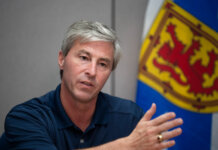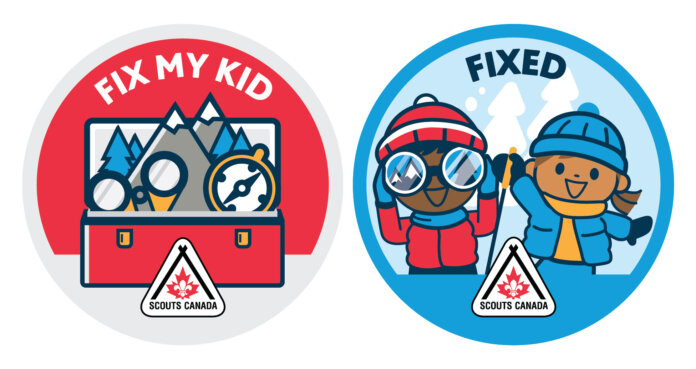From a release sent to The Laker News
FALL RIVER/OTTAWA, ONT.:Scouts Canada (the country’s leading co-ed youth organization) is standing up for kids from coast to coast across Canada that may be ‘underestimated.’
Scout’s recent survey of 1000 random Canadians uncovered surprisingly negative opinions of the soft skills, social ability and future-ready status of Canadian kids aged 10 to 21.
“We should never, ever count out the potential of Canadian kids,” said Scouts Canada.
The Scouts Canada suRvey highlights include:
- A combined 34.3% (over a third) of Canadians are NOT confident that the kids aged 10-21 in their lives will be able to get jobs in the future and be successful adults.
- 74.7% of Canadians believe that Gen X (1965-1976), Millennial (1977-1995) and Generation Z (1996-2010) parents have been ‘too soft’ on their kids aged 10-21.
- A combined definitive total of 91.2% of Canadians are concerned about kids aged 10-21 having no ‘soft skills.’
- ADVERTISEMENT:
- Canadians say the top skills kids aged 10-21 do not have are stress coping skills, basic etiquette problem solving and the ability to say thank you
- Asked what are the biggest dangers to kids today, Canadians said: social media channels, screens and lack of development, social/peer pressure, video games and helicopter parenting.
- A combined 94.7% of Canadians believe that kids aged 10-21 have suffered a disadvantage from growing up during COVID.
“No one should ever be counting out the potential of Canadian kids,” said Kathryn Ashby, Executive Director of Marketing and Communications for Scouts Canada. - “We all know that the current cohort of Canada’s 10–21-year-olds have had unique challenges with COVID shutdowns and an increasingly isolating digital world, but Canadians seem to be massively underestimating the resilience and potential of our kids.
- “Kids just need the right experiences and mentors to bring out their confidence.”
ADVERTISEMENT:
B. So, what can we do about it?
When asked What would you do today to ‘fix’ Canada’s 10-21 aged kids, Canadians said:
- 31.60% Expose them to more in-person social situations
- 29.20% Have parents stop solving all their conflicts
Just in time for the holiday season, Scouts has created a special program and a unique pair of badges to commemorate their national ‘Fix My Kid’ campaign.
The first badge is for parents and says, ‘Fix My Kid,’ the second is for kids and simply says, ‘Fixed.’ This way, kids and their parents or gift givers can share in the program together. The badges are available digitally as well as physically to kids and parents who sign up for a one-year Scouts Canada membership.
At a competitive cost of $270.00, for a one-year membership in Scouts Canada (compared to other youth organizations and sports programs), kids aged 5-25 can gain new skills, find new confidence, have adventures, forge friendships, engage creativity and learn leadership skills that will last them a lifetime and greatly accelerate their soft skills and leadership capabilities.
Scouts Canada also ignites curiosity, fosters innovation, and improves critical thinking and problem-solving skills.
“Canadian parents and caregivers already know that kids need exposure to leadership opportunities, mentorship, and comradery to develop critical soft skills … and that Scouts Canada is the best place to get them,” added Ashby.
“That’s why we have a waiting list as we work to bring these programs to kids across Canada.”
ADVERTISEMENT:
Registrations can be made online at https://www.myscouts.ca/ca/join. The 2025 Scouting year runs from January 1st, 2025, to December 3rd, 2025.
C. Expanded results from the survey:
- Adult Success SOS
A combined 34.3% (over a third) of Canadians are seriously concerned (21.7%) or not confident (12.6%) that the kids aged 10-21 in their lives will be able to get jobs in the future and be successful adults.
- Canadians are concerned about the kids
A combined definitive total of 91.2% of Canadians are seriously (33.4%), Kinda (25.3%), a little (18.3%) or somewhat (14.2%) concerned about kids aged 10-21 having no ‘soft skills.’
- Epic Overcorrection?
A definitive 74.7% of Canadians believe that Gen X (1965-1976), Millennial (1977-1995) and Generation Z (1996-2010) parents have been ‘too soft’ on their kids aged 10-21.
- Parenting Preparation
Asked if, in their opinion, parents of kids ages 10-21 are doing enough to prepare their kids for the future, a combined total of 75.9% of Canadians said NO (46.00%) or Maybe (29.9%)
- Vote of non-confidence
Asked how they think kids aged 10-21 will resolve not having soft skills and leadership skills, Canadians had a mix of optimism and concern:
12.4% simply said ‘they don’t think they will’ resolve it.
38.3% said that ‘the entire generation will have similar issues so they will have to work it out’
And 47.0% said Exposure to opportunities to develop problem-solving and leadership skills
6. Digital Dangers
Asked what the biggest dangers to kids are today, Canadians said:
Social Media Channels 39.30%
Screens and lack of development 25.00%
Social/Peer Pressure 16.20%
Video Games 10.00%
Helicopter parenting 6.70%
7. Skillfully Stunted?
Asked what skills Canadians think that kids aged 10-21 DO NOT HAVE, Canadians said:
a) Stress coping skills
b) basic etiquette
c) problem-solving
d) ability to say thank you
e) ability to have a conversation
f) confidence
g) leadership skills
h) ability to make friends
ADVERTISEMENT:
8. COVID Causality
A definitive combined 94.7% of Canadians believe that kids aged 10-21 have suffered a massive impact
(30.8%), some impact (48.6%) or a little impact (15.3%) disadvantage from growing up during COVID.
9. Future Foundations
Asked what skills they thought kids aged 10-21 needed the most for future success, Canadians said:
a) Stress coping skills
b) Communication skills
c) Problem-solving
d) Basic etiquette
e) Leadership skills
f) Confidence
g) Ability to have a conversation
h) Ability to say thank you
i) Ability to make friends
10) Parenting props by province
Asked what province is raising their kids aged 10-21 to be the most resilient and setting them up for the best
future successes, Canadians said:
36.50% Ontario
16.60% BC
14.0% Alberta
11% Quebec
5.20% Newfoundland and Labrador
4.7% Saskatchewan
3.90% Nova Scotia
3.70% Manitoba
2.90% New Brunswick
1.50% Prince Edward Island


































